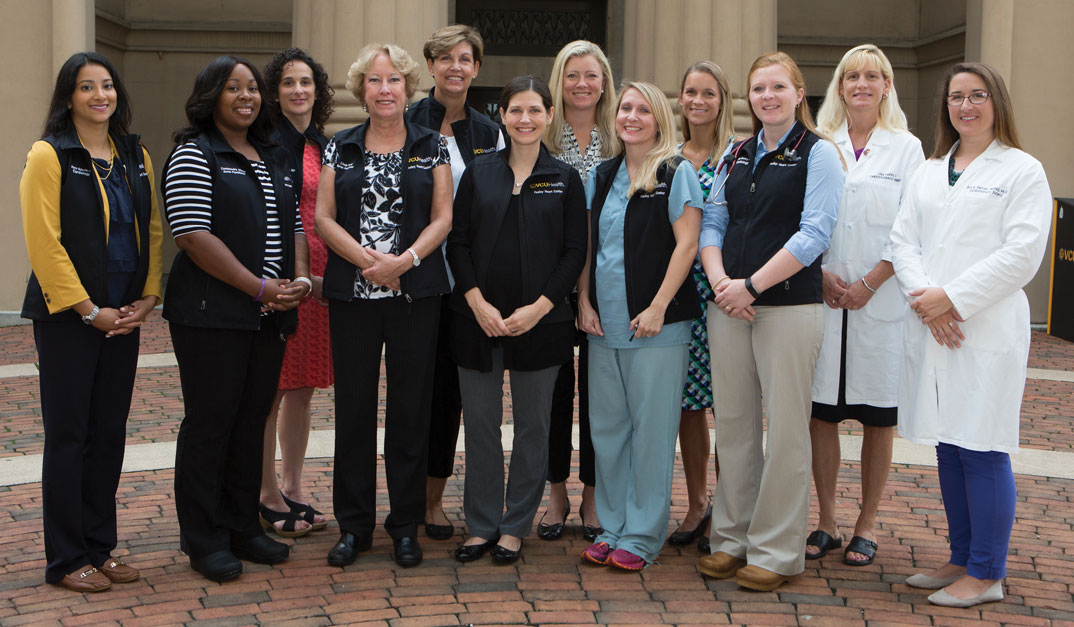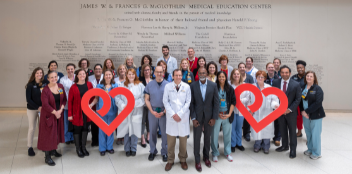New Responsibilities Lead to Rise of APPs

Mary Kay Jarrett, FNP-BC, is part of a growing trend. “I was drawn to advancing my nursing education when I met Judy Collins, a longtime Women’s Health Care nurse practitioner here at VCU many years ago. I witnessed her outstanding clinical skills as well as her excellent care of the entire patient. I knew right then that I wanted to pursue that kind of role,” said Jarrett, lead nurse practitioner for Cardiology.
Recent years have seen an increase in the number of highly trained clinicians like Jarrett who are known as Advanced Practice Providers, or APPs. Made up of nurse practitioners (NPs) and physician assistants (PAs), these individuals provide care to patients while supporting doctors in caring for the multi-dimensional needs of patients.
“APPs often have more time to spend with the patients and assist patients as they transition from the hospital to the home. They’re just wonderful care providers and are so expert in their field,” said Kenneth Ellenbogen, M.D., chair of the Division of Cardiology, which has 20 APPs.
NPs and PAs require specialized training, including at least a master’s degree, and must pass national exams. Both occupations require continuing education and recertification after a certain number of years.
Their numbers have grown due to a rapidly growing patient population, reduction in barriers to practice, and a reduction in the number of allowable hours for residents at the hospital.
“An APP can help the surgeon manage their ever-growing patient load without endlessly overbooking their clinics. This leads to reduced wait times for clinic appointments, reduced use of emergency rooms, higher patient satisfaction, and less burnout for the physician,” said Morgan Messner, one of two nurse practitioners in Vascular Surgery.
In the hospital, their duties can range from assisting in the operating room to providing bedside care to patients in ICUs, progressive care units, and outpatient procedure rooms.
“Our APPs work hard to collaborate care with other healthcare professionals to provide the highest level of patient care,” said Physician Assistant Erin Switzer.
“Each patient is important and cared for by these advanced practice providers with attention to detail in their medical management, compassion for their emotional needs, and care for the whole patient,” said Jarrett, who has been a nurse practitioner for 26 of her 30 years as a registered nurse.
During the critical inpatient time, working with others—from surgeons and nurses to fellows, residents and anesthesia and perfusion teams, as well as many other specialists—is key. “Our APPs work hard to collaborate care with other healthcare professionals to provide the highest level of patient care,” said Physician Assistant Erin Switzer, one of 18 APPs in Cardiac Surgery.
These advanced clinicians also help patients prepare for discharge by providing them with education about their condition, filling out the forms required by their employers, setting up any needed therapies, and arranging home health equipment and follow-up appointments. Once the patient is home, they may see them in outpatient clinics, refill medications, and respond to their questions.
“Our APPs are often more accessible to patients than our surgeons, who are frequently in the OR,” said Switzer. “Patients can reach our APPs via phone, the call center, or the portal.”
“The APPs are excellent clinicians and work both independently and in collaboration with our physician colleagues. They take time to listen to patients, ask questions and provide education and information,” said Jarrett. “The combination of these skills helps patients feel confident in their medical care as well as making them feel as if they are being heard.”
FROM LEFT TO RIGHT: FARIN BALA, PA; CASSAUNDRA MINTER, NP; VICKI GREEN, NP (BACK ROW); LINDA TONEY, NP ; MARY KAY JARRETT, NP (BACK ROW); KRISTIN COX, NP; JENNIFER CARLIN, NP (BACK ROW); MICHELLE KENNEDY, NP; AMY RUSNAK, NP (BACK ROW); KRISTYN RUDISILL, PA; LISA CAPPS, NP, AND ERIN SWITZER, PA
Back to Summer-2017

Join our Pauley Consortium composed of patients, friends and advocates.

